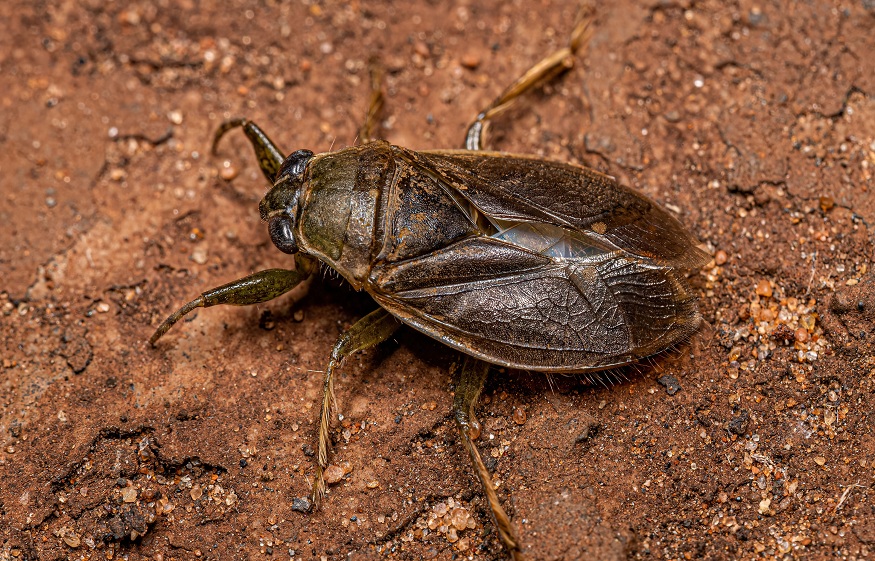Cockroaches and water bugs. They can appear similar at first. Moreover, many people mistake them for each other. Still, telling the difference is necessary since the approach to pest control differs greatly.
This article will cover the main differences between water bugs and cockroaches, discuss why accurate identification is critical, and offer some sensible cockroach management techniques.
So, let’s sort out what’s crawling around your house and how to get rid of it!
What are Water Bugs?
Let us define what a water insect is before we explore variations. Belostomatidae is a family of water bugs, sometimes known as “big” water bugs.
Though occasionally referred to as “water cockroaches,” these insects live in ponds, lakes, and streams, differing greatly from their land-dwelling counterparts.
Often up to 4 inches long, water bugs are really big and have a strong bite. You read correctly: water bugs bite, and it is not nice! Their piercing mouthparts feed tiny insects, tadpoles, and even tiny fish.
Though frightening as they sound, water bugs are not common house pests like cockroaches. Still, they occasionally find their way indoors in need of food or drink.
What are Cockroaches?
On the other hand, cockroaches are most likely the domestic pest you are familiar with.
Unlike water bugs, cockroaches are quite content to live among people, especially if there is food nearby.
They are members of the Blattodea family. Their diets can range from slights on the floor to soap residue in your bathroom. They are scavengers who will eat just about anything.
Although there are other cockroach species, the most common ones in homes are German, American, and Oriental cockroaches.
Usually only ½ to 2 inches long, they are far smaller than water bugs. You might find one if you turn the kitchen lights on at night, since they usually hide during the day and appear at night.
Key Differences Between Water Bugs and Cockroaches
Let’s analyse the main differences between water bugs and cockroaches so you can spot what might be hiding in your house.
Appearance
At first glance, water bugs and cockroaches seem the same, but closer inspection reveals their differences.
Water bugs are generally larger than cockroaches. Some species can reach over 4 inches. Their oval-shaped, dark bodies mirror cockroaches, but water bugs have a simpler, flat form.
On the other hand, cockroaches are typically smaller, have a more rounded, greasy appearance, and often have shorter antennas.
Habitat
Variations are most prominent here. Water bugs, as their name suggests, love water. Most likely, they were drawn to a water supply or strolled in from a nearby source of water.
Still, cockroaches are more flexible and can live almost anywhere. For them, warm, humid conditions are perfect. They particularly love kitchens and bathrooms as food and moisture are easily available.
Food
With a strong bite, water bugs chase anything from insects to fish to tadpoles. They are less likely to prowl your cabinet or chew on crumbs.
On the contrary, cockroaches eat practically everything and can survive in a variety of conditions. If you have food, cockroaches will hang around.
Attitude
One major difference is that water bugs are aggressive and bite if they feel threatened. With cockroaches, conflict is less likely to occur. They will stumble about when you get close, even though they won’t bite.
Breeding
Finding one or two does not usually point to an infestation, as water bugs do not breed indoors. Cockroaches breed very quickly. Seeing just one cockroach could be the tip of the iceberg, as a single female cockroach can lay hundreds of eggs.
Cockroach ControlMaintain a Clean House
Food attracts cockroaches. Clean spills, crumbs, or leftovers. Another rule you should have is to not leave dirty dishes in the sink overnight. Routinely remove your rubbish.
Keep your bathroom and kitchen clean since cockroaches can also eat non-food objects, including glue, toothpaste and soap.
Seal Entry Points
Cockroaches fit through the smallest cracks and crevices. Seal entry points around windows, doors, pipes and windows with caulk.
Eliminate Moisture
Cockroaches are drawn to moisture. Reduce the humidity in your house. This will make it less enticing for them. Repair any appliances, faucets, or leaking pipes.
In places like bathrooms or basements where moisture typically builds up, consider a dehumidifier.
Place Baits
Control infestations using cockroach baits and traps are quite successful. Place baits in dark corners where they typically hide beneath sinks, behind appliances, and near cockroach hotspots.
Professional Pest Control
You should contact experts if your cockroach problem is severe. Cockroach control services can also apply all-encompassing treatment strategies to eradicate the invasion. They can also point out possible house hazards and offer ideas for long-term avoidance.
Natural Cockroach Control Methods
If you would rather control cockroaches using a more environmentally friendly approach, there are a few natural techniques that might be able to repress these pests.
Diatomaceous Earth
Although it kills cockroaches, this naturally occurring repellent is safe for humans and dogs. Dust it in places where you observe cockroach activity. The powder will dry the cockroaches and kill them.
When Water Bugs Become a Problem
Although water bugs usually do not occupy homes the way cockroaches do, it is still crucial to know how to treat them if they enter your house.
Eliminating their access to water sources and sealing any holes they could use to enter your house can help you deal with water bugs most effectively. Usually, just eliminating the bug and making sure your house is dry and sealed will stop more problems.
Wrapping It Up
You now know the main differences between water bugs and cockroaches. Although they look alike, their ways of life differ greatly.
Whether it’s professional cockroach control or just keeping water bugs out of your house, knowing the pest you are dealing with can help you choose the appropriate fix. In most cases, cockroach infestations can be prevented rather than cured.
Maintain a clean home, seal doors, and, if necessary, call expert pest control services. Though nobody wants to live with bugs, you can drive them out permanently with the correct strategy.

